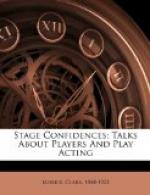The curtain was up, there was a little dialogue, and then the stage door opened. I dimly saw the actress spreading out her train ready to “come on,” the cue was given, a figure in pale blue and white appeared in the doorway, stood for one single, flashing instant, then lurched forward, and with a crash she measured her full length upon the floor.
The shocked “O-h-h” that escaped the audience might have come from one pair of lips, so perfect was its spontaneity, and then dead and perfect silence fell.
The actress lay near but one single piece of furniture (she was alone in the scene, unfortunately), and that was one of those frail, useless, gilded trifles known as reception chairs. She reached out her hand, and lifting herself by that, had almost reached her knee, when the chair tipped under her weight, and they both fell together.
It was awful. A deep groan burst from the people in the parquet. I saw many women hide their eyes; men, with hands already raised to applaud, kept the attitude rigidly, while their tight-pressed lips and frowning brows showed an agony of sympathy. Then suddenly an arm was thrust through the doorway; I knew it for the head carpenter’s. Though in a shirt sleeve, it was bare to the elbow, and not over clean, but strong as a bough of living oak. She seized upon it and lifting herself, with scarlet face and neck and breast, she stood once more upon her feet. And then the storm broke loose; peal on peal of thunderous applause shook the house. But four times in my life have I risked throwing flowers myself; but that night mine were the first roses that fell at her feet. She seemed dazed; quite distinctly I heard her say “off” to some one in the entrance, “But what’s the matter?”
At last she came forward. She was plump almost to stoutness, but she moved most gracefully. Her bow was greeted with long-continued applause. Sympathy, courtesy, encouragement, welcome—all were expressed in that general and enthusiastic outburst.
“Why,” said she after all was over, “at home they would have hissed me, had that happened there.”
“Oh!” exclaimed one who heard, “never; they could not be so cruel.”
“Oh, yes,” she answered, “afterward they might have applauded, but not at first. Surely they would have hissed me.”
And with these words ringing in my ears, no wonder that, figuratively speaking, I knelt at the feet of a New York audience and proudly kissed its hand.
CHAPTER XI
STAGE CHILDREN. MY “LITTLE BREECHES” IN “MISS MULTON"_
In the play of “Miss Multon” a number of children are required for the first act. They are fortunately supposed to be the children of the poor, and they come to a Christmas party. As I had that play in my repertoire for several years, I naturally came in contact with a great number of little people, and that’s just what they generally were, little men and women, with here and there at long intervals a real child.




